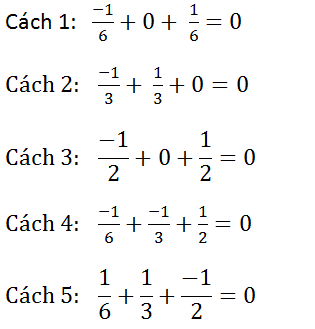Hãy nhập câu hỏi của bạn vào đây, nếu là tài khoản VIP, bạn sẽ được ưu tiên trả lời.

\(\frac{-1}{6}với\frac{1}{6},\frac{-1}{3}với\frac{1}{3},\frac{-1}{2}với\frac{1}{2}\)

a: =>1/2x=7/2-2/3=21/6-4/6=17/6
=>x=17/3
b: =>2/3:x=-7-1/3=-22/3
=>x=2/3:(-22/3)=-1/11
c: =>1/3x+2/5x-2/5=0
=>11/15x=2/5
hay x=6/11
d: =>2x-3=0 hoặc 6-2x=0
=>x=3/2 hoặc x=3

Bài 2:
a) Ta có: \(A=\dfrac{4}{n-1}+\dfrac{6}{n-1}-\dfrac{3}{n-1}\)
\(=\dfrac{4+6-3}{n-1}\)
\(=\dfrac{7}{n-1}\)
Để A là số tự nhiên thì \(7⋮n-1\)
\(\Leftrightarrow n-1\inƯ\left(7\right)\)
\(\Leftrightarrow n-1\in\left\{1;7\right\}\)
hay \(n\in\left\{2;8\right\}\)
Vậy: \(n\in\left\{2;8\right\}\)
ta có B=2n+9/n+2-3n+5n+1/n+2=4n+10/n+2 Để B là STN thì 4n+10⋮n+2 4n+8+2⋮n+2 4n+8⋮n+2 ⇒2⋮n+2 n+2∈Ư(2) Ư(2)={1;2} Vậy n=0

a. 5 - 3(x + 4) = -1
⇔ 5 - 3x - 12 = -1
⇔ 3x = -1 - 5 + 12
⇔ 3x = 6
⇔ x = 2
\(d,2x^2-3=5\)
\(\Leftrightarrow2x^2=8\)
\(\Leftrightarrow x^2=4\)
\(\Leftrightarrow x=\pm2\)
\(e,x\left(2x-1\right)=0\)
\(\Leftrightarrow\left[{}\begin{matrix}2x-1=0\\x=0\end{matrix}\right.\)
\(\Leftrightarrow\left[{}\begin{matrix}2x=1\\x=0\end{matrix}\right.\)
\(\Leftrightarrow\left[{}\begin{matrix}x=\dfrac{1}{2}\\x=0\end{matrix}\right.\)

a) \(\left(x-\dfrac{1}{2}\right)\left(-3-\dfrac{x}{2}\right)=0\)
Th1 : \(x-\dfrac{1}{2}=0\)
\(x=0+\dfrac{1}{2}\)
\(x=\dfrac{1}{2}\)
Th2 : \(-3-\dfrac{x}{2}=0\)
\(\dfrac{x}{2}=-3\)
\(x=\left(-3\right)\cdot2\)
\(x=-6\)
Vậy \(x\) = \(\left(\dfrac{1}{2};-6\right)\)
b) \(x-\dfrac{1}{8}=\dfrac{5}{8}\)
\(x=\dfrac{5}{8}+\dfrac{1}{8}\)
\(x=\dfrac{3}{4}\)
c) \(-\dfrac{1}{2}-\left(\dfrac{3}{2}+x\right)=-2\)
\(\dfrac{3}{2}+x=-\dfrac{1}{2}-\left(-2\right)\)
\(\dfrac{3}{2}+x=\dfrac{3}{2}\)
\(x=\dfrac{3}{2}-\dfrac{3}{2}\)
\(x=0\)
d) \(x+\dfrac{1}{3}=\dfrac{-12}{5}\cdot\dfrac{10}{6}\)
\(x+\dfrac{1}{3}=-4\)
\(x=-4-\dfrac{1}{3}\)
\(x=-\dfrac{13}{3}\)

a: =>x-3/4=1/6-1/2=1/6-3/6=-2/6=-1/3
=>x=-1/3+3/4=-4/12+9/12=5/12
b: =>x(1/2-5/6)=7/2
=>-1/3x=7/2
hay x=-21/2
c: (4-x)(3x+5)=0
=>4-x=0 hoặc 3x+5=0
=>x=4 hoặc x=-5/3
d: x/16=50/32
=>x/16=25/16
hay x=25
e: =>2x-3=-1/4-3/2=-1/4-6/4=-7/4
=>2x=-7/4+3=5/4
hay x=5/8

a: \(=\dfrac{7+12-6}{13}=1\)
b: \(=\dfrac{13}{10}\cdot\dfrac{6-26}{13}=\dfrac{-20}{10}=-2\)
c: \(=\dfrac{3}{4}\cdot2-\dfrac{5}{2}\cdot\dfrac{-4}{3}=\dfrac{3}{2}+\dfrac{20}{6}=\dfrac{3}{2}+\dfrac{10}{3}=\dfrac{29}{6}\)
d: \(=\dfrac{3}{8}\cdot\dfrac{8}{5}+\dfrac{3}{5}\cdot\dfrac{2}{7}+\dfrac{3}{5}\cdot\dfrac{5}{7}=\dfrac{3}{5}+\dfrac{3}{5}=\dfrac{6}{5}\)
cảm ơn bn, mình đặt câu hỏi, bn thườg xuyên trả lời câu hỏi của mình. Thank you very much.![]()

\(\dfrac{-1}{2}+0+\dfrac{1}{2}=0\)
\(\dfrac{-1}{3}+0+\dfrac{1}{3}=0\)
\(\dfrac{-1}{6}+0+\dfrac{1}{6}=0\)
\(\dfrac{-1}{6}+\dfrac{-1}{3}+\dfrac{1}{2}=0\)
\(\dfrac{-1}{2}+\dfrac{-1}{6}+\dfrac{1}{2}=0\)
cảm ơn nha mk biết cái bài từ lâu rồi hihi